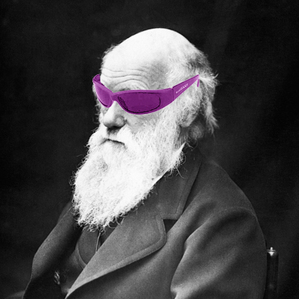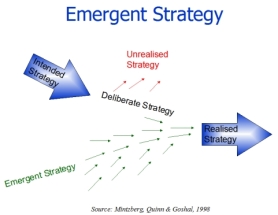One of the recent tasks on my course has been to study, in a little more detail, some of the work of a leading individual author on strategic thinking. I have blogged previously about Henry Mintzberg, a man with an engaging writing style, insightful thinking and what appears to be an honest approach to challenging the establishment view of his subject despite actually being part of its foundations.
In his monologue, “The Illusive Strategy…25 Years Later” (1993) Mintzberg references his first article, written as a doctoral student, way back in 1967 in which he highlights ideas that have spanned and defined his academic career; a comparison of deliberate and emergent strategy.
He wrote:
“Man’s beginnings were described in the Bible in terms of conscious planning and grand strategy. The opposing theory, developed by Darwin, suggested that no such grand design existed but that elemental forces gradually shaped man’s evolution. The disagreement between the Biblical and darwinian theorists is paralleled on a more mundane level in the study of strategy-making. There are those who envision grand calculated designs for the corporate entity, and there are those who cite current practice to argue that organisational strategy evolves, shaped less by man than by his environment.” (1967:71)
As we have worked through these concepts on our course I have gained some small insights into the complex world of strategic planning. As discussed in the earlier blog there is clearly a significant interplay in the set out and recorded, deliberate strategy and the final, outworked, emergent strategy. I wonder if the distinction between the two, as with concepts of evolution, might actually be an artificial construct of the two theories each suggesting its own mutual exclusivity. Whereas the reality may more reasonably a combination of the two.

In discussion around evolution, darwinists are unable to explain without the use of hypothesis and teleology exactly why human kind, above all others, should have become pre-eminent whilst supporters of intelligent design struggle with ideas such as the extinction of dinosaurs. Neither of these facts negates the contrary theory.
In strategic theory it is clear that deliberate strategy is essential for the corporate entity, as Mintzberg put it, but it seems unlikely the emergent strategic result is totally independent of this and purely a result of the environment. The original plan, the effectors of it and the environment all bring about the eventual result.
 The 1998 paper Mintzberg, Quinn and Ghosal (1998) looked into organisations with and without explicit strategic plans, the effect of this on the staff within the organisation and the ultimate outcome. Importantly, and intriguingly, the principal finding was that the realised strategy of the organisation was not directly related to the intended, deliberate strategy, the precise and explicit plan of the organisation, but more an outworking of the non deliberate and hugely variable strategies of the work force; emergent strategy.
The 1998 paper Mintzberg, Quinn and Ghosal (1998) looked into organisations with and without explicit strategic plans, the effect of this on the staff within the organisation and the ultimate outcome. Importantly, and intriguingly, the principal finding was that the realised strategy of the organisation was not directly related to the intended, deliberate strategy, the precise and explicit plan of the organisation, but more an outworking of the non deliberate and hugely variable strategies of the work force; emergent strategy.